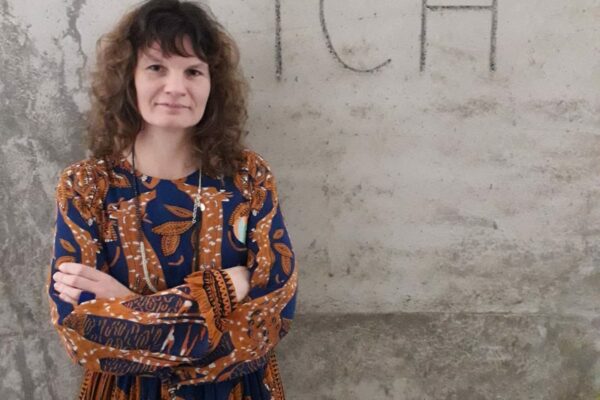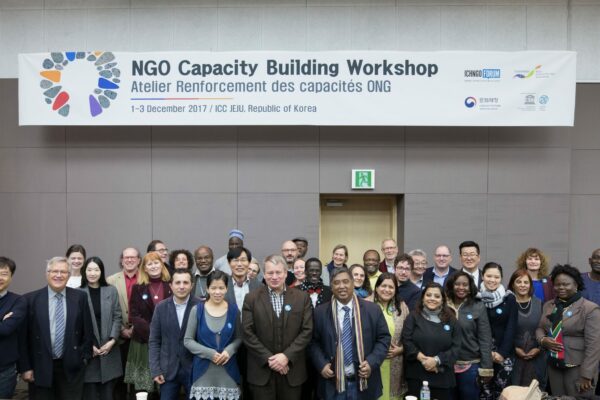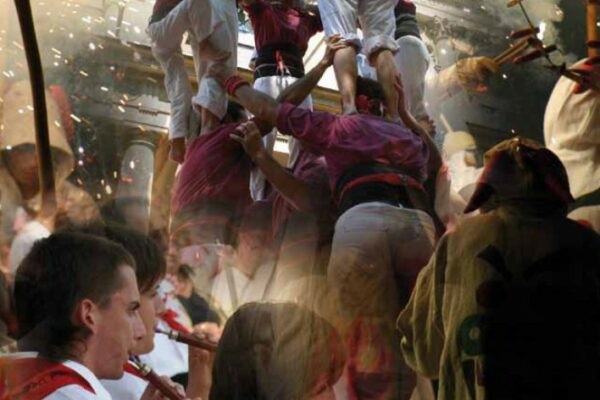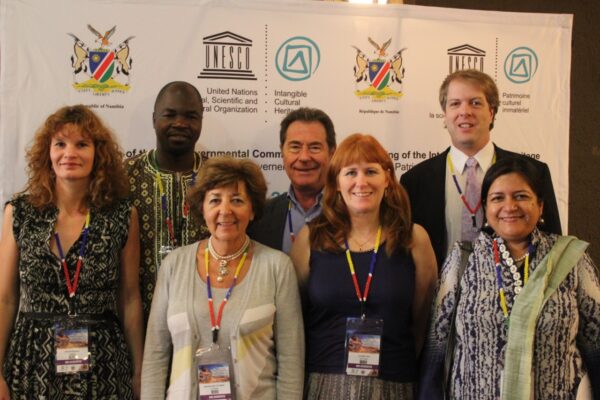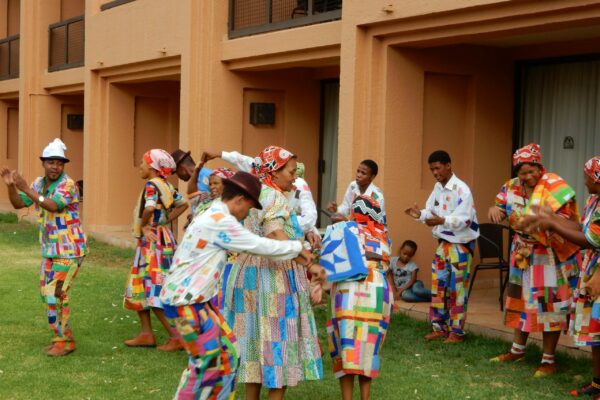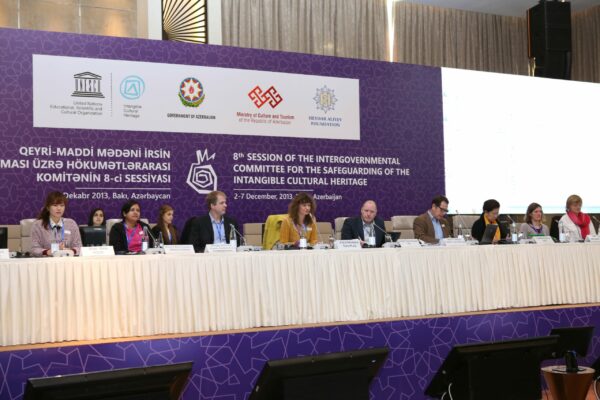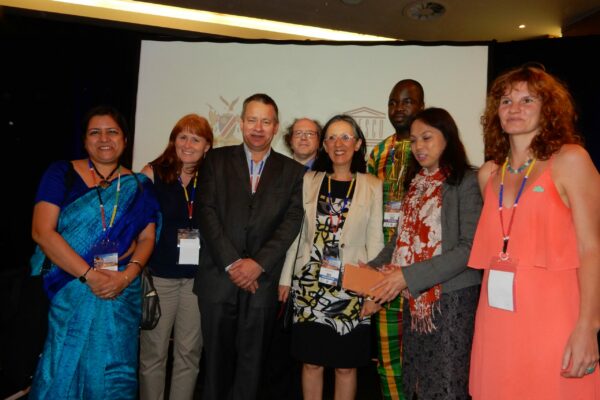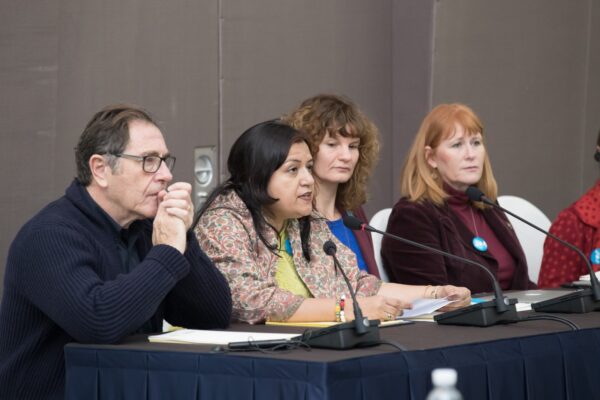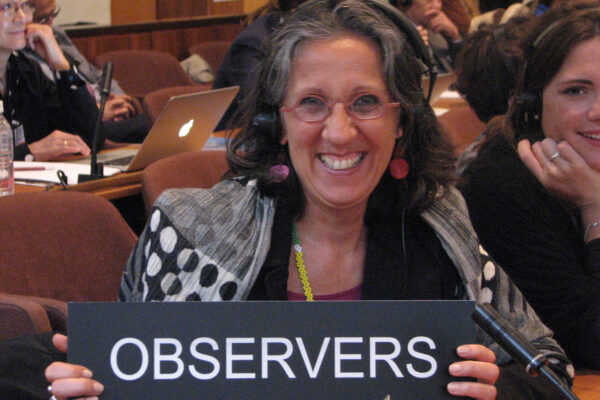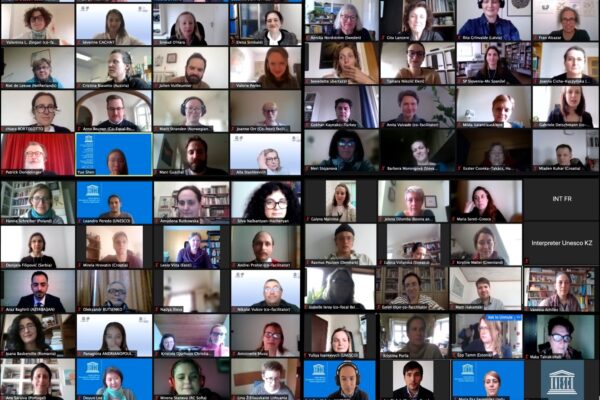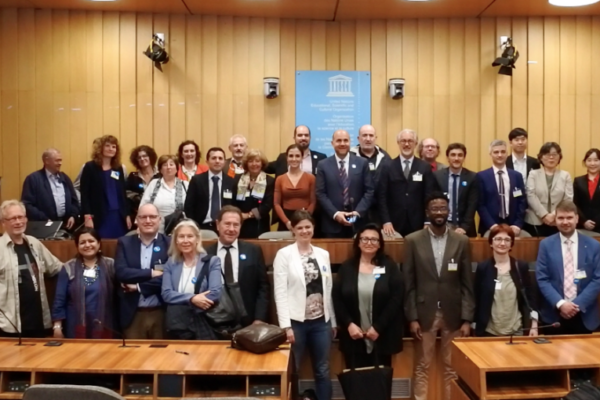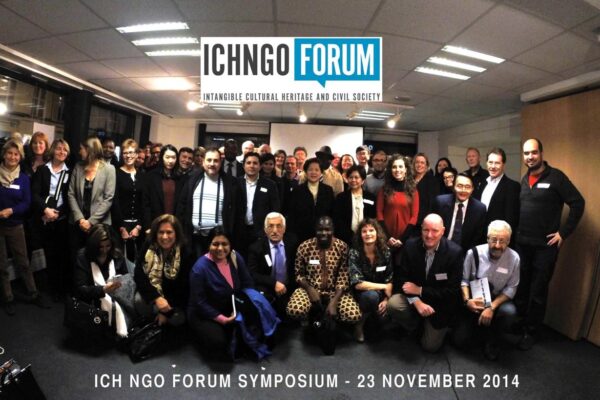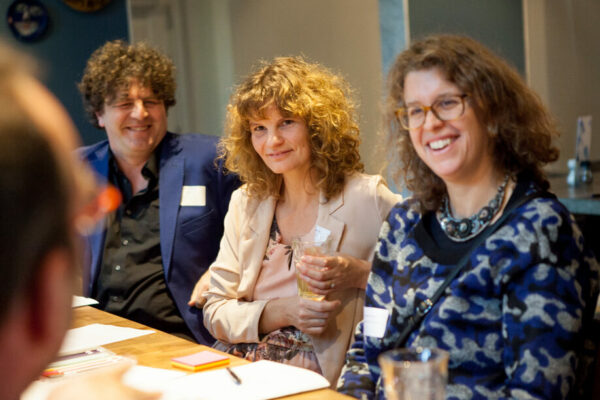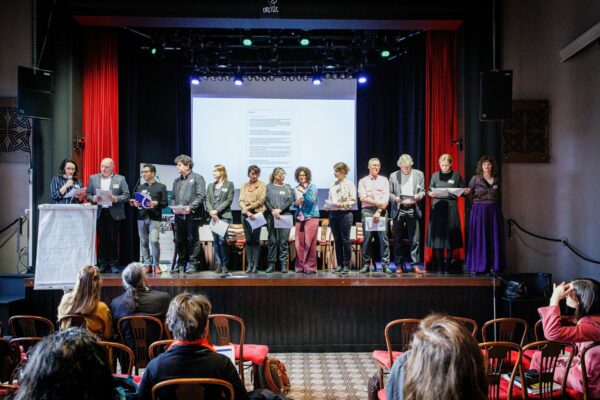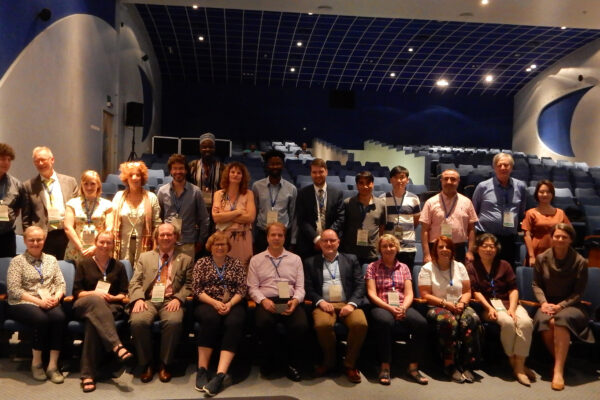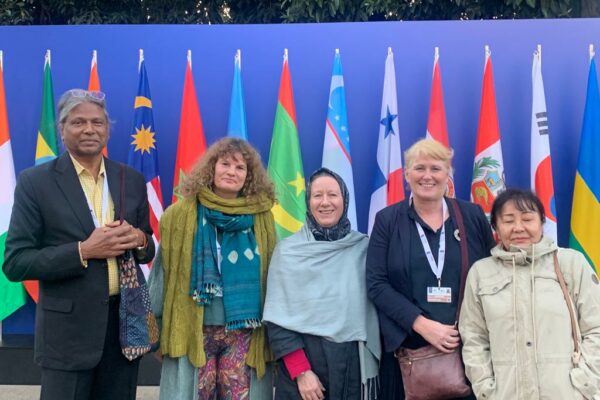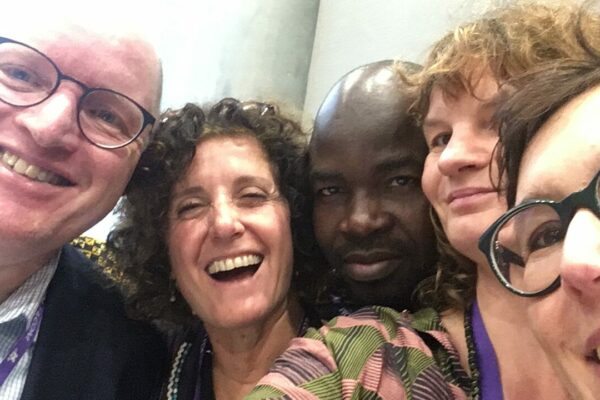A Message – to reflect on 20 years of UNESCO 2003 Convention
We love living heritage – for a future leaving no one behind
Dear UNESCO 2003 Convention,
I remember arriving for the first time at the UNESCO Headquarter in Paris to participate in the intergovernmental meeting of the 2003 Convention for the Safeguarding of the Intangible Cultural Heritage (ICH). Our NGO had just become accredited under the Convention, and I was thrilled to join the work.
Like many others present, I tried to understand what happened in that meeting room, learning to decode the rules of the game – both formal and implicit. Sitting with numerous other ‘observers’ in the back of the Room, I wondered what brought each of them to be here…
It would only take some more hours before many of these ‘observers’ gathered in what would become later on well-known as the ICH NGO Forum.[1] A few years later, the ICH NGO Forum would become considered an inspiring practice of NGO network development and involvement in the UNESCO framework.[2]
It has been some 15 years now since me and many other colleagues entered the life of the Convention and joined these meetings. The people in the Room have become cherished ‘compagnons de route’ in a shared commitment to safeguarding living heritage around the world. UNESCO and the 2003 Convention can be considered as a contact zone in which many peoples and cultures with different backgrounds come together, and by which they can see their (hybrid and fluid) ‘cultural identities’ supported in rapidly changing contexts as a sort of ‘platform in the world’.[3]
But, along the way, the picture grew also bigger than that: thinking outside the box of our Convention.
The challenges we face today as a global community require mind-shifting ways of thinking and action.
And moving in the work and networks of the ICH Convention over the past decades, we learnt to see that there is so much there, just in front of us, if we only start seeing the wealth of what our ancestors have been handing down to us.
Therefore, it is up to us to conceive ICH no longer as mainly protecting past inheritances and legacies of communities and groups. We have come to understand the wisdom of all those living heritages. Altogether they are our reservoir of human cultural knowledge and knowhow. We find here so many solutions and proven recipes from as many contexts, times and generations, from which we may draw for sustainably developing into a shared future where we all belong.
In this globalising world where more than ever cultural practices and groups are interacting, there more than ever possible solutions from the many repertoires become collated and combinable in various ways.
With such an approach, what started once maybe mainly as a protecting and preserving perspective of heritage within a globalizing world, has come to shift towards an open, transformative and development-orientated attitude. It brings us to safeguarding our world in cross-pollinating and intercultural learning and sharing.
Participation
The commitment to participatory safeguarding is core to the mission of the 2003 Convention. Participation of communities, groups and individuals involved in the ICH is key for every safeguarding initiative. In the same spirit the 2003 Convention has been a pioneer in the UN frameworks to explore participation of civil society in heritage governance, by inviting NGOs from all the regions of the world to relate to the work of the Convention and establishing an accreditation process to this end (Bortolotto & Neyrinck 2020).
NGOs accredited by UNESCO may provide advisory services to the Intergovernmental Committee in the framework of the Convention.[4] This has been foremost limited to the advisory work on nomination files within the Evaluation Body however. But from the very beginning NGOs have done far more work on the Convention beyond providing advisory capacity for the Evaluation Body. NGOs contribute in many ways and take on a variety of roles at international, national and local levels.
In doing so, the factor of accreditation has proved significant. Accreditation is ‘on the ground’ often valued as a form of recognition in the context of the Convention. You could say the symbolic capital and the effect of accreditation for NGOs are somewhat similar to inscriptions on the UNESCO Lists for ICH elements (Neyrinck 2014). Furthermore, accreditation also has become the access route to the entire network of accredited NGOs under the Convention over the years, and the Convention networks more at large. It is here that the power of networking and collaboration among actors in living heritage and safeguarding from around the world comes to the fore.
Joining forces – the ICH NGO Forum experience
After the Convention became operational in 2008 and the accreditation of NGOs started, the collaboration and collective efforts by the NGOs have grown remarkably through their development of a Forum of accredited NGOs (ANGOs). NGOs themselves were naturally already engaging in safeguarding ICH in many contexts. But now they also began coordinating a number of their activities through the ICH NGO Forum. Even though the potential roles of ANGOs were not elaborated at the time of drafting the Convention text, nor later in the Operational Directives, the launch of the ICH NGO Forum soon became a reality, and the Forum of NGOs has begun to carve out its place through practice over the years.
The ICH NGO Forum functions as an international platform for communication, networking, exchange and cooperation by ANGOs. Through the Forum, particular efforts have been made to important topics and areas of development in the life of the Convention: for example, the Forum started to work on the sharing of safeguarding experiences with the online journal #HeritageAlive on experiences from the field.[5] The Forum elaborates capacity building tailored to the NGOs. And it commits to building networks for exchange and cooperation, with multiple working groups that face actual and future challenges in the ICH safeguarding realm: ethics for ICH, working with the Overall Results Framework, developing ICH research with and by NGOs …
Since 2012, the Forum organizes every year a symposium and holds its plenary meeting on the governance of the Forum as side-events to the intergovernmental committee meetings where all stakeholders gather.[6]
The ICH NGO Forum now brings together more than 200 ANGOs working across the world and with a myriad of different competencies in safeguarding ICH. They range from community-based organizations to larger NGOs which support national- and international-level implementation of the Convention and engage in policy development. As such, it brings to the Convention extensive and highly diverse safeguarding experiences and expertise. In view of the huge diversity of ICH elements and their related communities, groups and individuals, no single organization is capable of providing such advice. Indeed, diversity is essential to be able to respond to the multi-dimensional nature and questions of ICH and its actors.[7] Therefore the diversity among ANGOs and within the NGO Forum is a gift – and even a critical quality- to work in safeguarding the diverse living heritage with the Convention.
We love living heritage: ICH brokers, facilitators and mediation
Over the past decade, we have also drawn special attention to taking up important roles of mediation, facilitation and cultural brokerage related to safeguarding ICH from local to global levels (Jacobs, Neyrinck & van der Zeijden 2014). Indeed, the 2003 Convention on the one hand involves a top-down operation with a standard setting framework, but on the other, thanks to article 15 of the Convention, it is an invitation to devise bottom-up solutions and approaches. This is why brokers who are also ‘translators’ are so crucial (Jacobs 2014).
Roles of mediators, brokers and facilitators are important for bridging and connecting in this multi-level and multi-stakeholder universe, and to help safeguarding programmes and other participatory heritage processes work and succeed. Since 2016, moreover, also the Convention’s Operational Directives put forward the concept of ‘brokers’, in the context of the chapter on sustainable development.
Indeed, an impressive power of this convention is embodied by the numerous people and actors who commit and join forces around living heritage with such passion and dedication. They choose to dedicate their time and efforts to living heritage, they love and cherish it, they foster participation and collaboration for safeguarding purposes.
Each of us contributes in our own ways, with different and complementing strengths. Policy makers, community associations, the UNESCO Secretariat colleagues, researchers, heritage institutions, facilitators, NGOs… And lucky to be a Convention of the 21st Century, many of us can work agile and focused on challenges and opportunities that arise in transnational contexts. This also explains how NGOs have become key actors and drivers taking emerging issues forward working alongside the Committee meetings and formal steps forward. Think for example of enhancing museums’ involvement with ICH, developing sustainable tourism approaches, or bolstering the online presence of living heritage in our digital times.
In what follows, we briefly elaborate on some of these experiences.
IMP – ICH and Museums
Between 2017 and 2020 the ICH & Museums Project explored approaches, interactions and practices on ICH in museums, with a view to foster the contact zones where the safeguarding of living heritage and museums work connect.
The IMP project is a strong example of an initiative that sprouted from the networking and sharing experiences and challenges among ANGOs in the Forum. Amidst the issues faced, one recurrent theme revealed to be the relation between ICH and museums. In the European context museums are paramount actors in the heritage sector from local to national levels. Hence also the rising question on the museums’ role towards living heritage.
A group of accredited NGOs and UNESCO facilitators took the lead to develop a European cooperation project, and looked for funding by the Creative Europe programme. Soon three major international networking partners in the Museums field ad the ICH field joined the process: ICOM international | the International Council of Museums, NEMO | the Network of European Museum Organizations, and the ICH NGO Forum. The UNESCO secretariat offered a support letter.
It marked the start of a networking platform involving a multitude of experiences. IMP organized a series of international conferences and expert meetings, and co-creations between museums and ICH practitioners in five countries. The findings of the project were incorporated in a dedicated website www.ICHand-museums.eu, a toolkit and a series of publications, of which the most substantial is the book: Museums and Intangible Cultural Heritage: Towards a third space in the heritage sector. A companion to discover transformative heritage practices for the 21st century. Several years later, we note that the book and website are actively consulted in all corners of the globe. Most importantly, IMP continues to have a leverage effect, with new follow-up initiatives emerging. It has given birth to a learning network of stakeholders around ICH and Museums worldwide.
Paving the way forward for sustainable tourism with living heritage
Another fruit of collaboration is the online dossier on ICH and sustainable tourism that was launched by the ICH NGO Forum in 2022.[8]
When ICH gains wider attention, for example linked to UNESCO listing, tourism is never far away. Tourism may be a major means for presenting ICH which can help sustain it, or endanger its community-based practice. It is also an important source of income and employment. In recent years, debates of the UNESCO IGC meetings raised questions on tourism’s impacts on ICH. Some expressed concerns about (over)commercialisation and decontextualisation. The member states thus requested that the UNESCO secretariat publish guidelines with recommendations.[9]
Through elaborating a web dossier on ICH and sustainable tourism, the initiative takers wished to feed the actual reflections and to assist in the development of sustainable ICH tourism. This web dossier provides general context, discussion on key issues, useful tools, and international reference documents, publications and online resources. It shares examples and experiences of sustainable tourism initiatives involving ICH. It’s a resource where one can find out how communities have developed tourism centered on ICH that represents their culture on their own terms, things to avoid when presenting ICH to tourists, and how anyone working in the heritage sector can enable communities and groups to foster sustainable tourism.
Again, this initiative of the ICH NGO Forum involving at the same time numerous ICH researchers and facilitators, boasts mutual dialogue and cooperation, and it aims to create a platform where key actors and networks committed to develop good practices on tourism and ICH can get together.
Wiki loves living heritage
A recent initiative from wider civil society networks is ‘Wiki Loves Living Heritage’.
To celebrate living heritage and mark the twentieth anniversary of the 2003 Convention ‘Wiki Loves Living Heritage’ campaign was launched in the spring of 2023 with the idea of being a participatory, community-driven initiative calling on heritage practitioners, Wikimedia volunteers and cultural institutions around the world to document and celebrate their living heritage. The common goal being to integrate awareness-raising and documenting activities in a participatory manner – online and grassroots – to enhance the safeguarding of living heritage worldwide.
The campaign spawns a range of initiatives across many countries -from Finland or Belgium via Singapore to Canada and Chili: photo contests, importing and linking ICH inventories via Wikimedia, writing sessions on wikipedia pages, … This results in a rich, evolving archive of openly available photographs and videos and documentation on Wikimedia Commons about living heritage in all corners of the globe.
Wiki Loves Living Heritage salutes the rich tapestry of cultural traditions in our interconnected world, and nurtures the collective appreciation for living heritage. It creates learning and skill sharing opportunities for both the local Wikimedia communities as well as the ICH Focal Points, facilitators, accredited ICH NGOs and other stakeholders. In doing so, it combines a strong commitment to ethical sharing while promoting open access to cultural heritage. The legacy of the campaign is to bring new kinds of communities together to start the dialogue and to find new ways of working together.[10]
Looking back & forward
Celebrating the 20th anniversary of the 2003 Convention, this is a good moment to reflect on our joint efforts in safeguarding living heritage with the Convention.
In those 20 years, the number and range of people, organizations and countries committing to this Convention and its overall aim of safeguarding the rich diversity of living heritage across the world, has been growing and widening at an impressive pace. This truly is the Spirit of this Convention, bringing together so many of us from various backgrounds, areas, levels and scales.
All of us, relating to safeguarding ICH with the Convention – practitioners, States Parties, accredited NGOs, Category II Centres, researchers, facilitators, etc.– function more and more through approaches of networking and collaboration.
We are global and glocal learning Networks in safeguarding living heritage, shifting, linking and connecting among numerous contexts. And we find each other time and again at UNESCO. Another year has passed. And new steps are being taken.
With the Spirit of the Convention on the backdrop, and the Overall Results Framework as a tool and a compass, we may set course in a shared direction.
To mutate our living heritage legacies into practices that better answer the challenges of our time and the future times ahead of us. It calls for a shift or mutation on various levels. But we are well underway.
The next stage, the next 20 years, we will be mobilising the power of all those networks, and not letting ourselves be confined by lists, boundaries and other demarcations.
Let’s deploy all those built capacities for even more dialogue and cross-pollination, to celebrate and empower the richness and diversity of living heritage and the people behind, and to cultivate all the precious knowledge, wisdom and inspiration embodied in ICH towards sustainable and shared futures.
Jorijn Neyrinck
Jorijn Neyrinck is comparative anthropologist and director of the organization ‘Workshop intangible heritage’. From 2003 on, she started taking a role in the field regarding the development of policies and network cooperation around living heritage. Examples are the ICH and Museums Project (IMP) in Europe between 2017 and 2020, the steering committee of the ICH NGO Forum (until 2018), and since 2021 of the European Network of Focal Points for the UNESCO 2003 Convention (ENFP). Furthermore, Jorijn is active within the Global Network of facilitators for the Capacity Building Programme for the 2003 Convention, and she has provided advisory services as a member in the UNESCO Evaluation Body (2020 to 2022). In her home country she is also committed as vice-chair of the national Commission to UNESCO in Flanders. Since 2019 she has co-organized the development of the online web dossier on ICH and Sustainable tourism by the ICH NGO Forum Research Working Group, to address the evolving questions and issues related to the economic dimensions of safeguarding living heritage within the 2003 Convention’s implementation.
– – – – –
My warm thanks and thoughts go to the countless friends and colleagues, travelling companions and soulmates met along the way.
Endnotes
[1] ICH NGO FORUM, About us, viewed 16 June 2023.
[2] UNESCO, Enhancing and promoting the commitment and contribution of UNESCO’s NGO partners” – The 2018 international Conference of NGOs, viewed November 5, 2023.
[3] “Een perron in de wereld”, quoting the Dutch sociologist Bram de Swaan, who once expressed this in his volume Perron Nederland. Amsterdam, 1991.
[4] See: article 9 of the Convention. UNESCO, Text of The Convention for the Safeguarding of the Intangible Cultural Heritage, viewed November 5,2023.
[5] ICH NGO FORUM, #HeritageAlive, viewed November 5, 2023.
[6] ICH NGO FORUM, About us, viewed November 5,2023.
[7] See also the Report of the ICH NGO Forum presented at the 17.COM IGC meeting in Rabat, Morocco: UNESCO, https://ich.unesco.org/doc/src/LHE-22-17.COM-9-EN.docx, viewed November 5,2023.
[8] ICH NGO FORUM, Web dossier on intangible cultural heritage and sustainable tourism, viewed November 5, 2023.
[9] See among other: UNESCO, Decision of the Intergovernmental Committee: 14.COM 10 and Fifteenth session of the Intergovernmental Committee for the Safeguarding of the Intangible Cultural heritage: Summary records of the fourteenth session of the Committee, LHE/20/15.COM/5, viewed November 5,2023.
[10] See: Wikimedia Meta-Wiki, Wiki Loves Living Heritage, viewed November 5, 2023.
[11] See: https://ichworldforum.org/wp-content/uploads/2023/08/2023-WORLD-FORUM-FOR-INTANGIBLE-CULTURAL-HERITAGE-1.pdf , viewed November 5, 2023.
References
This Message partially builds on my contribution elaborated for the 2023 ICH World Forum in South-Korea[11]
Blake, J & Lixinski, L 2020, The 2003 UNESCO Intangible Heritage Convention – A Commentary. Oxford University Press, Oxford.
Bortolotto, C & Neyrinck, J 2020, « Article 9 », in J Blake & L Lixinski (eds), The 2003 UNESCO Intangible Heritage Convention – A Commentary. Oxford University Press, Oxford, pp.153-163.
ICHCAP 2014, Towards Efficient Roles of NGOs for Safeguarding ICH in the Asia-Pacific Region, Republic of Korea, viewed November 5, 2023.
ICH NGO FORUM, Web dossier on intangible cultural heritage and sustainable tourism, viewed 16 June 2023.
Jacobs, M 2014, ‘Development Brokerage, Anthropology and Public Action. Local Empowerment, International Cooperation and Aid: Safeguarding of Intangible Cultural Heritage’, Volkskunde. Tijdschrift over de cultuur van het dagelijks leven, vol.115, no.3, 2014, pp. 299-318.
Jacobs, M, Van Der Zeijden, A & Neyrinck, J 2014, Brokers, facilitators and mediation: critical success (f)actors for the safeguarding of intangible cultural heritage – Theme issue, Volkskunde, vol. 115, no.3, pp. 249-432.
Jacobs, M 2020, Article 15: Participation of Communities, Groups, and Individuals. CGIs, not just ‘the Community’. in J Blake & L Lixinski (eds), The 2003 UNESCO Intangible Heritage Convention – A Commentary. Oxford University Press, Oxford, pp. 273-289.
Jacobs, M & Neyrinck, J 2020, ‘Transforming, Not Saving. Intangible Cultural Heritage, Museums and/or the World’, Volkskunde, vol. 121, no. 3, pp. 481-502.
Jacobs, M, Neyrinck, J & Tsakiridis, E 2020, ‘Safeguarding Intangible Cultural Heritage and Museums. A Crossing of Several Projects and Trajectories’, Volkskunde, vol. 121, nr. 3, blz. 241-248.
Neyrinck, J 2014, ‘Beyond the Conventional – How to Foster Co-production for Safeguarding ICH’, Volkskunde. Tijdschrift over de cultuur van het dagelijks leven, vol.115, no.3, pp. 319-337.
Neyrinck, J, 2017, ‘Intangible Cultural Heritage in Times of Superdiversity: Exploring Ways of Transformation, International Journal of Intangible Heritage, 12, pp. 157-174.
Neyrinck, J, Seghers, E &Tsakiridis, E 2020, ‘At the interface between living heritage and museum practice: dialogical encounters and the making of a “third space” in safeguarding heritage’, International Journal of Intangible Heritage15, pp. 61-85.
Tsakiridis, E, Seghers, E, Nikolić Đerić, T & Neyrinck, J 2020, Museums and Intangible Cultural Heritage. Towards a Third Space in the Heritage Sector. A Companion to Discover Transformative Heritage Practices for the 21st Century. Werkplaats Immaterieel Erfgoed, Brugge.
Ubertazzi, B 2013, ‘Non-Governmental Organizations and the 2013 session of the UNESCO Intangible Cultural Heritage Committee’, in Conforti, B, Ferrari Bravo, L, Francioni, F, Ronzitti, N, Sacerdoti, G & Pavoni, R (eds), Italian Yearbook of International Law, Brill, Leiden, pp. 299-324.
UNESCO, Report of the non-governmental organizations forum, LHE/22/17.COM/9, viewed November 5, 2023.
Wikimedia Meta-Wiki, Wiki Loves Living Heritage, viewed November 5, 2023.

